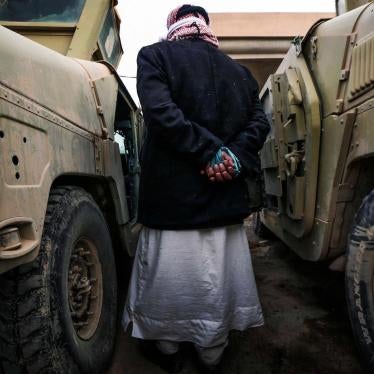We are writing to you as the executive directors of Human Rights Watch and the Committee to Protect Journalists to express our ongoing concern about the U.S. military’s failure to develop and implement adequate procedures at military checkpoints in Iraq. More than two years after the March 2003 invasion, flawed checkpoint procedures continue to unnecessarily endanger the lives of civilians and U.S. service members.
We are writing to you as the executive directors of Human Rights Watch and the Committee to Protect Journalists to express our ongoing concern about the U.S. military’s failure to develop and implement adequate procedures at military checkpoints in Iraq. More than two years after the March 2003 invasion, flawed checkpoint procedures continue to unnecessarily endanger the lives of civilians and U.S. service members.
While the exact number of civilians killed or wounded at checkpoints in Iraq is not known, an October 2003 report by Human Rights Watch, titled “Hearts and Minds,” suggests the scope of the problem. Of the 18 deaths the report documented as resulting from actions by U.S. soldiers, between May and September 2003, 11 came at checkpoints.
After the fall of Baghdad, Human Rights Watch expressed concern to U.S. Army ground commanders about excessive civilian deaths at checkpoints. The commanders responded that they had identified many problems in their checkpoint procedures and were taking steps to correct them. U.S. service members who have served in Iraq have also raised concerns about checkpoint procedures. Improving security for U.S. soldiers staffing checkpoints, they have noted, would reduce the risk to civilians, including Iraqi citizens, journalists, and others working in Iraq.
Developing and implementing new checkpoint procedures should be a priority for U.S. commanders. Checkpoint shootings have sparked outrage among Iraqi citizens, undermining public confidence in the U.S. military. In one striking incident in January that was documented by photojournalist Chris Hondros, U.S. soldiers in Tal Afar opened fire on a vehicle carrying an Iraqi family and killed both parents. In another incident last November 15, American troops opened fire on a bus killing at least three Iraqi civilians after it “ignored a verbal warning and several warning shots,” according to the U.S. military statement.
The March 4 fatal shooting of Italian intelligence officer Nicola Calipari further highlights checkpoint deficiencies. A U.S. military investigation released on April 30 exonerated U.S. military personnel involved in the shooting—but it also clearly showed that the Army failed to implement the lessons learned during two years maintaining checkpoints. The shooting, which left the Italian journalist Giuliana Sgrena seriously injured, also drew attention to the risks that journalists face in Iraq.
Reporters have told the Committee to Protect Journalists that approaching U.S. checkpoints can be a terrifying experience. Three journalists and a media worker have been killed by soldiers at U.S. checkpoints, and there have been many other incidents in which guns were raised or warning shots fired. While covering the Iraqi elections in January, National Public Radio correspondent Anne Garrels came under fire as her car approached a checkpoint in central Baghdad. After Garrels identified herself as an American journalist, Iraqi soldiers told her they had orders to shoot any car that moved down the road. A checkpoint manned by U.S. soldiers was just ahead.
We recognize that these troubling incidents are sometimes a response to the very real danger that U.S. service members face while manning checkpoints; many soldiers have been killed or wounded in attacks on checkpoints. But that is all the more reason to ensure that proper procedures are in place to protect both soldiers and civilians. As former Marine Capt. Nathaniel Fick pointed out in an op-ed published in The New York Times on March 13, current checkpoint procedures do not provide adequate security for U.S. troops. As a result, they also unnecessarily endanger Iraqi civilians. U.S. service members often confront an impossible dilemma with only seconds to make a decision about whether an approaching vehicle is hostile and whether to employ deadly force. The procedures used to warn vehicles—hand signals, flashing lights, and warning shots—have proved ineffective. Warning shots are sometimes mistaken for hostile fire, causing drivers to accelerate.
The U.S. military investigation into the March 4 checkpoint incident that killed Calipari and left Sgrena wounded included a series of recommendations for improving the safety of civilians approaching checkpoints. Many are similar to those made by Human Rights Watch in its October 2003 report.
Among the recommendations proposed:
- Using non-lethal measures such as spike strips, temporary speed bumps, and wire to slow down or disable approaching vehicles;
- Launching a public awareness campaign using billboards and printed material to educate drivers about “their responsibilities for behavior” when approaching checkpoints;
- Using signs in both English and Arabic, and incorporating international symbols, to warn drivers;
- Using sirens and rotating warning lights;
- In the case of permanent checkpoints, installing permanent highway overpass signs announcing upcoming checkpoints;
- Evaluating current checkpoint techniques that require a gunner to operate both the spotlight used to warn vehicles and the weapon that is fired when a vehicle fails to stop.
We believe that the immediate implementation of these recommendations will reduce the risk to civilians in Iraq, including journalists, as well as to U.S. service members manning checkpoints. We urge you to ensure the current review is carried out as expeditiously as possible, and we would welcome the opportunity to meet with the Force Protection Working Group that is evaluating checkpoint procedures.
Sincerely,
Ann Cooper
Kenneth Roth
c.c. Condoleezza Rice
Secretary of State
c.c. Stephen J. Hadley
National Security Advisor
c.c. Senator Richard G. Lugar
Chairman, Foreign Relations Committee
c.c. Representative Henry J. Hyde
Chairman, International Relations Committee






